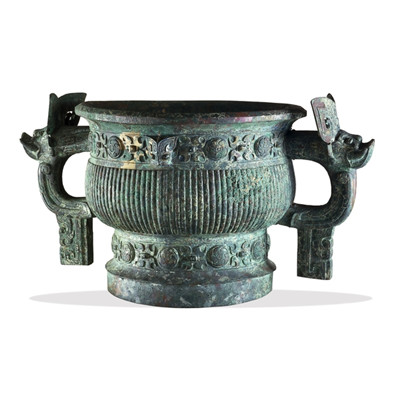(单词翻译:单击)
中英文本
The sheer skill, the effort and expense involved in making bronze vessels like these make them immediately objects of the highest value and status, fit therefore for the most solemn ceremonies.
在这一过程中所花费的技术、时间与费用,使得它们价值昂贵,地位崇高,可用于最庄严肃穆的场合。
Here's Dame Jessica Rawson, renowned expert on Chinese bronze:
中国古青铜器的知名专家杰西卡罗森爵士。
"The first dynasties of China, the Shang and the Zhou, made large numbers of fine bronze containers for food, for alcohol, for water, and used these in a big ceremony, sometimes once a week, maybe once every ten days.
中国最早的两个王朝—商朝与周朝,都制作了大量盛放食物和酒水的青铜容器,用于七天一次或十天一次的大型祭祀活动。
The belief is that if food, wine or alcohol is properly prepared, it will be received by the dead and nourish them, and those dead, the ancestors, will look after their descendants in return for this nourishment.
他们相信,如果这些食物酒水准备得当,逝去的祖先便能享用,并会因此保佑子孙后代衣食丰足。
The bronze vessels which we see today were prized possessions for use in life.
当然,我们所看到的这些青铜器,是极奢华的日常生活用品,
They were not made primarily for burial, but when a major figure of the elite died, it was believed that he would carry on offering ceremonies of food and wine to his ancestors in the afterlife, indeed, entertain them at banquets."
并非主要为葬礼准备,但如果某个重要人物去世,人们相信他在死后还是会继续用食物供奉祖先,更确切地说,是以盛宴来取悦他们。
Our bowl would have been one of a set of vessels of different sizes, rather like a set of saucepans in a smart modern kitchen.
它可能是一套不同尺寸的青铜器中的一件,如同现代智能厨房中的一套大小不一的深平底锅。
although we don't know how many companions it might once have had.
虽然我们并不了解一套中所包含的确切数量,
Each vessel had a clearly defined role in the preparing and serving of food at the regular banquets that were organised for the dead.
但在为逝者准备食物的过程中,每一件青铜器必定都有不同的用途, 用来存放不同的物品。

重点讲解
1.look after 照顾;关心
I will look after her child when she is on a business trip.
她出差时我将照看她的孩子。
They looked after the train as it moved out.
他们目送火车开出车站。
2.carry on 继续
Our neighbour is always carrying on at her children.
我们那个邻居总是向孩子们发脾气。
She is always carrying on about the rising cost of living.
她总是唠唠叨叨地抱怨生活费用不断增长。


